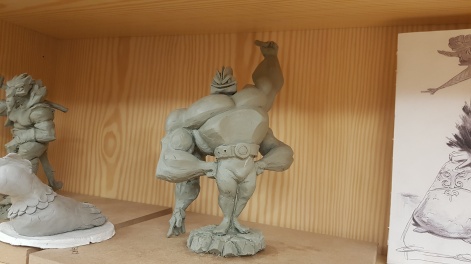While visiting King's Stockholm HQ last week, we had the opportunity to sit down with company president Tjodolf Sommestad to explore an intriguing array of mobile gaming topics.
After kickstarting our conversation with what Sommestad's role actually entails, we also discussed Candy Crush’s 16,000 levels and counting, how the team continues to innovate, King's use of AI, and a sweet selection of Sommestad's tips for fledgeling developers.
PocketGamer.biz: What's the inside story on King? What does the average day entail for the president of such a giant company?
Tjodolf Sommestad: Great question. I wonder if there is like, ‘an average day’. I think I have a mix of days. Like some are interacting with the media, but not that many. I spend a lot of time talking to our leadership teams on what our product plans are going forward, what our marketing plans are, how we engage with players, what’s working well in our games…
One specific role I have, I would say, is to orchestrate shared learning and transparency across the company, which is really important for our culture. So, without overloading everyone, or being in meetings all the time, it’s making sure information travels across the company and that insights can be shared. Like the learnings when we achieve something great. That collaboration works so well.
Part of that is then making sure that our objectives and decisions are as clear as they can be, and that we have a clear assignment on when we’re expecting to make decisions. Resourcing questions is of course part of that as well.

So we look at where are we investing in marketing efforts right now? Why does that make sense? There are a lot of data-driven decisions that we look at as a team. We quite often talk to, prepare for, or are in meetings with all our employees - like twice a month we have town halls with everyone and I also join some smaller group meetings trying to have a finger on the pulse a bit.
I also share what’s important right now.
Our teams are very distributed and there’s a lot of video meeting time, so when I do the town halls we have them in the afternoons - I guess you could say three o’clock Swedish time - so the folks in the US can join. So there is a lot of face-camera time.
Collaboration, curiosity, and transparency. I think those are important factors to have.
In what ways has King had to adapt to keep entertaining audiences through the years, through such a fast-changing gaming landscape?
I think we just need to accept it - things are going to change. And when they change we keep being curious, keep learning. I talk about ‘learning’ a lot with my teams because I think it's a key part of how we're going to be successful in the future.
And we’re good at that day-to-day, like when we do 100 different A/B tests in one of our big games. We learn from our players all the time, but we also test different things organisationally as well. Like, what if we approach a project this way? What if we have this composition this way? Maybe we should try this new thing over here? And if it didn’t work? Okay, let's not do that.

I think we also need to push ourselves into sometimes being a bit uncomfortable, like introducing a new business model with advertising into our games. We need to have some patience and figure out how to do that, which means that it's a long journey. But then the outcome will be the right one.
And I think there’s going to be more of that. The industry is going to keep evolving. AI is one interesting area where I think that we certainly challenge the industry more broadly. And we really try to be on top of that. We have some concrete applications. You saw some of our uses of AI today, but we also need to be in learning mode.
We don't have all the answers on how generative AI is going to help us tomorrow, but we need to really start stretching our learning skills in order to try testing it.
It's a journey. We’re always learning.
How do your developers and designers feel about AI technology being introduced?
Shifting more and more of our attention to where we have the most players has been a winning strategy.Tjodolf Sommestad, King
Broadly excited, I would say. They see the opportunities with how they can get help to do a little bit more quality work - whether they’re an artist or a level designer or a programmer. It could be other things as well like finding information or documentation, like it's not necessarily the most fun thing to do as a developer, but it's essential when you're going to improve something and deliver something new.
And I think AI tuning can help us accelerate how we document and share information. So overall, I would say that there's an excitement for AI which doesn’t surprise me: we’re an organisation that has had this learning mindset and this curiosity for a long time, so it's quite easy to start leaning into that and seeing where this can take us.
Is AI involved in the creation process? After over 16,000 levels, how does the team keep coming up with new ideas for levels?
I ask myself that sometimes as well!
So, I don't know if they're using it for levels, but I know that I myself use it to bounce creative ideas around and test them. With AI, you can make a mock-up of something very quickly to get ideas across can then be discussed with a colleague.
I know some artists are looking at different ways to use this, but we're at a very early stage; the things that we have operationalised are more like testing levels and the refinement of them. While AI does propose improvements, it doesn't yet come up with new levels from scratch. It’s more of a tool rather than being fully automated.
I think there's a level of craftsmanship that needs to be there.

To the outsider, wouldn't having 50 games be better than your carefully curated selection of long-tail, long-running games? What's the reason for your careful approach, focusing on a small number of games and sustaining them?
We have tried different models over the years - not over the whole 20 years, but at least 10 years since we started launching some of these really big hit games - and we've learned along the way what works and what doesn't. At least for King.
So there's a risk and a complexity in having many games and making sure that you serve the players fully. You need to figure out the scaling of it.
I think that it's good to have a diverse portfolio and that's something that we've tried a bit, but we also learned along the way that it's extremely challenging to deliver amazing experiences in all of those games, so it hasn't been the right model for us.
But also if you look at the industry more broadly, if you have a really good game, what we're seeing is that players in the free-to-play mobile market start engaging quite deeply and invest their time and they want to have more of that rather than something else.
Keep making the game better; keep investing to get more players; entertain the players that you have.Tjodolf Sommestad, King
And so for us, shifting more and more of our attention to where we have the most players has been a winning strategy. Because in the end, we want to make the world more playful, and the best way for us to do that is by having the greatest impact in the games where we have the most players.
What advice would you give to an indie mobile games developer starting out today? How do you grow an audience? How do you advertise in such a saturated market?
On mobile, you should really be thinking of games-as-a-service and free-to-play. It's an expectation of players that a mobile game is free-to-play. So make sure that you have an amazing game that has amazing long-term retention. That's your first priority.
And it’s not easy to get there. You need to test your way somehow, get comfortable that you know how to get there and what it takes to launch a game that can have this longevity. Figure out where your audience is and then start scaling, and have patience.
It takes time.
If you're really lucky, you could end up with a game that gets a big boost initially via word of mouth or getting picked up on a platform, but otherwise you need to have patience. And even if you get that initial wave, you need to reinvest the earnings back into further marketing the game so you keep driving attention over time.
Keep making the game better; keep investing to get more players; entertain the players that you have. There is no silver bullet: if it were that easy, we would do it.
But I would also encourage developers to keep trying.
Sure, it's a more mature market now than it used to be, but there’s a lot to learn from and there's a big audience out there. Billions of people have a mobile phone and want something fun to do, so there absolutely are opportunities.
More King on the way…
We had plenty of fascinating conversations during our time at King HQ with the teams working on Candy Crush, Farm Heroes Saga, AI and more. Expect more juicy, sugary scoops to follow…
In the meantime, we spoke with Candy Crush Soda VP of product Paula Ingvar just before our trip, who shared turning her hobby into a profession.




















